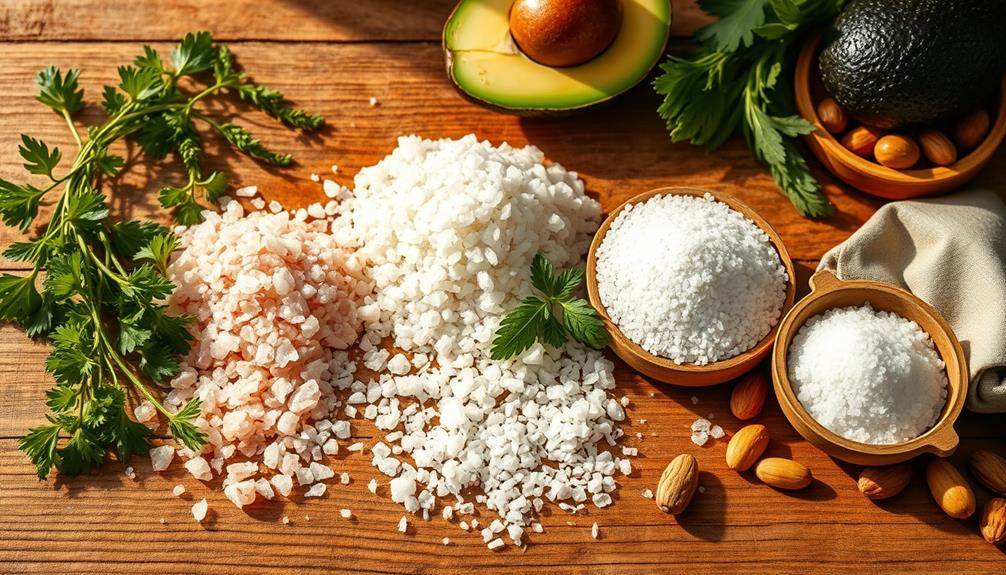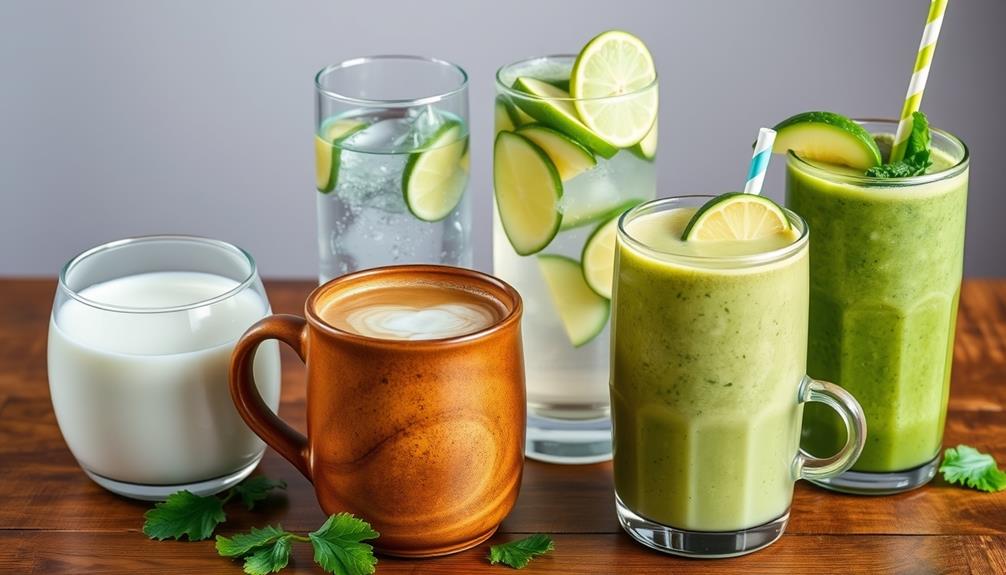To reveal the power of fats for your keto diet, focus on incorporating healthy types of fats, which should make up 70-80% of your daily calories. This high-fat approach encourages your body to burn fat for energy instead of carbs. Opt for sources like avocados, olive oil, nuts, and fatty fish to reap benefits like better heart health and appetite control. Be mindful of portion sizes to avoid excessive calorie intake. By making informed choices about which fats to consume and their portion size, you'll enhance your keto experience and enjoy greater results. There's even more to discover about optimizing your fat intake!
Key Takeaways
- Fats should comprise 70-80% of daily calories in a keto diet to achieve effective ketosis and fat burning.
- Incorporate healthy fats like avocados, olive oil, and fatty fish to improve heart health and support weight loss.
- Monitor macro balance to ensure optimal fat intake and avoid excess calories that could hinder weight loss progress.
- Utilize cooking methods with healthy fats, like coconut oil or butter, to enhance flavors and energy levels in meals.
- Regularly assess fat intake to align with dietary goals while prioritizing whole food sources over processed options.
Understanding Fats and Their Types

When diving into the world of fats, it's vital to recognize their various types and roles in your diet. You'll encounter saturated, monounsaturated, polyunsaturated, and trans fats, each impacting your health differently.
Healthy fats, like those from avocados, olive oil, and fatty fish, are essential for energy and cellular function. They play a significant role in balancing hormones and supporting heart health. Omega-3 and Omega-6 fatty acids are particularly important for managing inflammation.
Be cautious, though; trans fats and highly processed oils can increase your risk of heart disease. Understanding these distinctions helps you make informed choices, promoting better cholesterol levels and overall wellness in your daily meals.
Embrace the right fats for a healthier lifestyle!
Role of Fats in Keto Diet

The role of fats in the keto diet is fundamental to achieving and maintaining ketosis, a metabolic state where your body primarily burns fat for energy instead of carbohydrates. By consuming a high-fat diet, you shift your metabolism to prioritize fat burning, which can lead to reduced appetite and improved cholesterol levels. For effective ketosis, fats should make up about 70-80% of your total daily calories.
| Type of Fat | Example Sources |
|---|---|
| Saturated Fats | Coconut oil, butter |
| Monounsaturated Fats | Olive oil, avocados |
| Polyunsaturated Fats | Fatty fish, walnuts |
| Trans Fats | Processed snacks (avoid) |
Tracking your macros guarantees you're getting the right balance for best results.
Benefits of Healthy Fats

Harnessing the power of healthy fats can considerably enhance your keto journey, offering a range of benefits that support both your physical and mental well-being. Incorporating healthy fats, such as avocados, coconut oil, and fatty fish, into your ketogenic diet can help improve your energy levels, regulate your appetite, and promote better brain function. Additionally, essential oils for ketogenic diet, such as MCT oil, can provide a quick source of energy and support ketosis. These essential oils can be easily added to your favorite keto-friendly recipes or blended into smoothies for an extra boost.
Healthy fats provide you with essential energy for daily activities and exercise, helping you feel fuller longer, which promotes weight loss. They also improve heart health by increasing HDL cholesterol levels and lowering triglycerides while reducing inflammation.
By incorporating healthy fats into your meals, you'll likely experience better lipid profiles and improved cognitive function. Regular consumption supports metabolic functions vital for weight loss and helps stabilize your blood sugar levels.
Embracing healthy fats not only fuels your body but also elevates your overall health, making your keto lifestyle more effective and enjoyable.
Best Sources of Healthy Fats

To successfully incorporate healthy fats into your keto diet, focus on high-quality sources that provide essential nutrients and energy.
Avocados are a fantastic choice, packed with monounsaturated fats and fiber. Olive oil is another staple, rich in antioxidants and perfect for dressings.
Nuts and seeds, like almonds and chia seeds, offer a great balance of Omega-3 and Omega-6 fatty acids. Don't overlook coconut oil, which contains medium-chain triglycerides (MCTs) for quick energy.
Finally, fatty fish such as salmon are excellent for their Omega-3 content, supporting heart health.
Incorporating Fats Into Meals

Incorporating healthy fats into your meals can transform your keto experience, making it more enjoyable and satisfying.
Start by drizzling olive oil on your salads or using it as a base for homemade vinaigrettes. Add avocados to your smoothies or enjoy them sliced with a sprinkle of salt.
Nuts and seeds can be great snacks or toppings for yogurt, providing crunch and nutrition. When cooking, opt for coconut oil for its quick energy properties or butter for flavor.
Don't shy away from incorporating fatty fish into your meals; they're packed with omega-3s.
By making these simple adjustments, you'll elevate your meals while ensuring you meet your fat intake goals for a successful keto diet.
Enjoy the journey!
Risks of Excessive Fat Intake

While healthy fats are crucial for your keto journey, it's important to be aware of the risks associated with excessive fat intake. Overindulging in fats can lead to increased cholesterol levels, which may heighten your risk of heart disease.
You might also find that consuming too many calories, even from healthy fats, can stall your weight loss progress. Additionally, excess fat intake can disrupt your body's balance, leading to potential digestive issues.
It's crucial to monitor your portions and focus on quality fats to avoid these pitfalls. Remember, a balanced approach is key to maintaining a sustainable keto lifestyle without compromising your health.
Prioritize moderation to fully enjoy the benefits of healthy fats.
Guidelines for Healthy Fat Consumption

Monitoring your fat intake is essential for reaping the benefits of a keto diet without facing health risks.
To guarantee you're making healthy choices, consider these guidelines:
- Opt for natural, whole food sources of fat like avocados, olive oil, and fatty fish.
- Practice portion control to avoid excessive calorie intake, even from healthy fats.
- Stay mindful of your overall caloric consumption to maintain a balanced diet.
Frequently Asked Questions
Can I Eat Fats Without Following a Keto Diet?
Yes, you can eat fats without following a keto diet. Incorporating healthy fats like avocados and olive oil into your meals can enhance flavor and provide essential nutrients, benefiting your overall health regardless of dietary approach.
What Are the Symptoms of Fat Deficiency?
If you're experiencing fatigue, hair loss, dry skin, or poor concentration, you might have a fat deficiency. Your body needs healthy fats for energy and to support essential functions, so consider adjusting your intake.
How Do Fats Affect Mental Health?
Did you know that 60% of your brain's dry weight is fat? Healthy fats support cognitive function, mood regulation, and brain health. Include sources like avocados and fatty fish to boost your mental well-being effectively.
Are There Vegan Sources of Healthy Fats?
Yes, there are plenty of vegan sources of healthy fats! You can enjoy avocados, nuts, seeds, coconut oil, and olive oil. These options provide essential nutrients and support your overall health and well-being.
Can Cooking Oils Lose Nutrients When Heated?
When heated, certain cooking oils can lose up to 30% of their nutrients. You should choose oils with higher smoke points, like avocado or olive oil, to preserve their beneficial properties during cooking.
Conclusion
As you begin your ketogenic journey, remember that fats are your friends! Did you know that incorporating healthy fats can boost your metabolism by up to 30%? By choosing the right fats and balancing your intake, you'll not only enhance your chances of reaching ketosis but also support your overall health. So, embrace avocados, olive oil, and fatty fish in your meals, and reveal the true power of fats in your keto lifestyle. Enjoy the journey!









